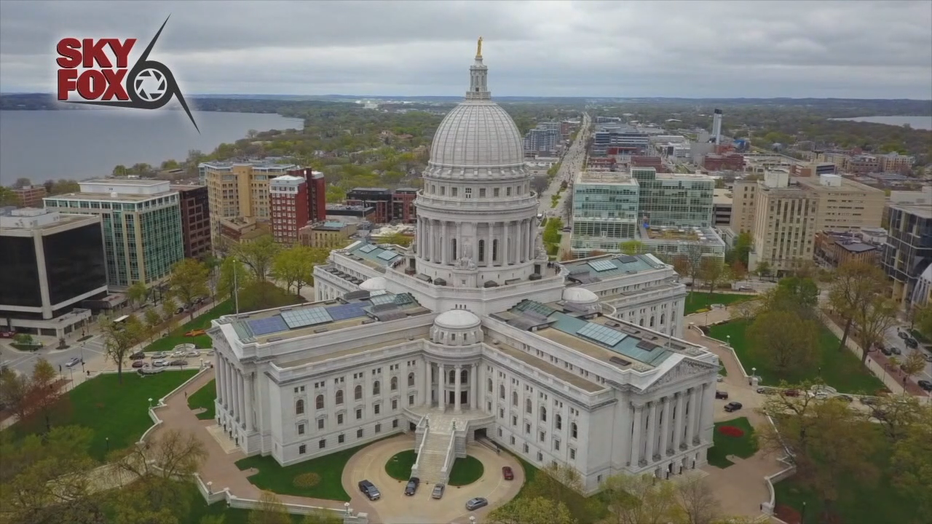Gov. Evers cites revenue, reform in push to legalize marijuana

Gov. Evers cites revenue, reform in push to legalize marijuana
Gov. Evers and Lt. Gov. Barnes said legalizing both medical and recreational marijuana is a pivotal piece in bringing Wisconsin out of the pandemic.
MILWAUKEE - Gov. Tony Evers estimates the legalization and regulation of marijuana could provide Wisconsin with $165 million in new tax revenue in 2023.
He outlined that proposal and more in a budget listening session Wednesday night, April 14 -- and offered a spending plan for the money as well.
Gov. Evers would like to divide the added revenue among community reinvestment, equity grants and critical aid for rural school districts.
Of course, the administration will have to work with Republicans in the state Legislature for it to pass.
Selling their Badger Bounceback agenda in a virtual listening session, Gov. Evers and Lt. Gov. Mandela Barnes said legalizing both medical and recreational marijuana is a pivotal piece in bringing Wisconsin out of the pandemic.
"We know that there are severe disparities in enforcement. It just makes sense for us to take this step," Barnes said.
In addition to financial benefits, the push for legalizing marijuana would also play a role in changing Wisconsin's criminal justice system.
"An important piece of this proposal would be to modify criminal penalties for marijuana-related crimes to align with decriminalization," said Gov. Evers.
The governor's budget proposal would regulate marijuana just like alcohol. However, Republicans say focusing on the money Wisconsin could collect, just as 17 both states have done, is the wrong way to handle the issue.
FREE DOWNLOAD: Get breaking news alerts in the FOX6 News app for iOS or Android.
"I don't believe that the marijuana proposal should be part of the budget. It should stand on its own as legislation. There should be a full debate and a full discussion," said State Rep. Adam Neylon of Pewaukee. "We want to be much more conservative and cautious with how we approach this," said Neylon.
Gov. Evers and Barnes also touted their budget proposal's intention to spend more money on the UW System than on the Department of Corrections.
Governor's case for criminal justice

Governor’s case for criminal justice
Gov. Evers said marijuana enforcement, which impacts communities of color the most, is outdated and unjust. If his plan passes, he would allow offenders to repeal or reduce their sentence -- a point that could have bipartisan support.
Gov. Evers said marijuana enforcement, which impacts communities of color the most, is outdated and unjust.
If his plan passes, he would allow offenders to repeal or reduce their sentence -- a point that could have bipartisan support.
"We know that we need systemic change in Wisconsin. We've needed it for a few decades now," Barnes said.
At the heart of their biennial budget proposal, Gov. Evers and Barnes say Wisconsin must improve the criminal justice system.
"There's just no true path forward for our state without justice reform," said Gov. Evers. "It's the dot that we have got to connect if we want to make sure that our state and our communities bounce back from this pandemic better than from before it hit."
A key piece in that, as outlined in Wednesday's session, is legalizing medicinal and recreational marijuana -- providing the state the chance to revisit its punishment for past crimes. It's a point Republicans could agree on.
"I think we can find some common ground on some decriminalization aspects and even potentially moving into medicinal," said Neylon.

Wisconsin Capitol in Madison
Neylon said he thinks both sides could find common ground in decriminalizing simple marijuana possession, even allowed medical marijuana use, but that there must be more discussion on how it would impact public health.
Republicans in control of the Legislature now have the task of sending some form of Gov. Evers' proposed budget back to his desk for approval.
The joint finance committee is also hosting listening sessions around the state, with the next one scheduled for April 21 in Rhinelander.
Featured
Jacob Blake's uncle: Rusten Sheskey lost service weapon while on leave
The officer who shot Jacob Blake has returned to the force in Kenosha, and Blake's family says Officer Rusten Sheskey lost his service weapon while on paid leave, resulting in a new investigation.
Featured
Wisconsin teachers resign in wake of slavery question
Three Wisconsin middle school teachers have resigned after they put together a lesson for sixth-graders asking them how they would punish slaves.
Featured
AG Kaul: Wisconsin DOJ gets sexual assault kit tracking database
The Wisconsin Department of Justice is setting up a tracking system to trace the status of sexual assault evidence kits in effort to ensure they're processed quickly.




